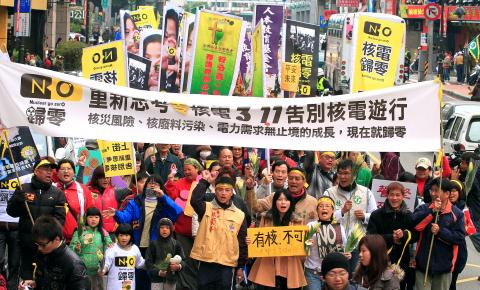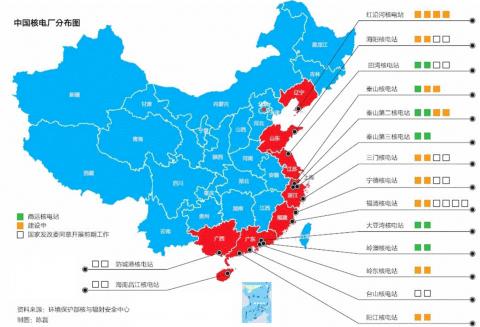Thousands of opponents of nuclear energy from across the nation paraded in the streets of Taipei yesterday to mark the first anniversary of the March 11 earthquake and tsunami in Japan, which crippled the Fukushima Dai-ichi nuclear power plant.
“Nuclear go zero — rethink nuclear power” was the main theme of the protest, during which participants urged the public to consider the risks posed by a nuclear disaster, nuclear waste contamination and unlimited demand for electricity.
At 1:46pm (2:46pm in Japan, when the earthquake struck), the crowd held a minute of silence for the victims of the disaster before moving from Longshan Temple MRT Station.

Photo: CNA
Organizers estimated that more than 5,000 people and more than 100 NGOs took part in the rally.
With processional troupes from religious groups leading the parade, protesters held yellow balloons with anti-nuclear slogans, banged on African drums while shouting battle cries and held green paper windmills symbolizing “green” energy as they marched through the streets.
Participants from the Humanistic Education Foundation held black and white portraits of themselves, similar to those used in funeral processions, saying there would be no tomorrow if a nuclear disaster occurred.

Photo: Lin Chia-chi, Taipei Times
“Many people think that the possibility of a nuclear disaster is a distant one ... but actually the Jinshan Nuclear Power Plant [in Shihmen District (石門), New Taipei City (新北市)] and the Guosheng Nuclear Power Plant [in New Taipei City’s Wanli District (萬里)] are less than 30km away from us, and the Fourth Nuclear Power Plant [in New Taipei City’s Gongliao District (貢寮)] is only 40km away from the Presidential Office,” Taiwan Environmental Protection Union secretary-general Lee Cho-han (李卓翰) said.
“We are protesting today for the children of today and tomorrow,” Lee said.
A special feature of the parade was the participation of Tao Aborigines from Lanyu, who oppose the dumping of nuclear waste on the island by Taiwan Power Co (Taipower).
“Against nuclear waste, save Lanyu. Against nuclear power, save Taiwan,” the residents of Lanyu shouted, with several people in traditional dress and occasionally performing a ritual to drive evil spirits (nuclear waste) away by shouting in a low-pitched voice.
Sinan Mavivo, an anti-nuclear activist and resident of Lanyu, said that for the past 30 years the children of Lanyu had grown up under the threat of nuclear waste in their homeland, while many people on the island have been diagnosed with cancer that has very likely been caused by radiation from the waste.
“A researcher at Academia Sinica last year confirmed there was radioactive leakage near the nuclear waste storage [facility] on the island,” she said. “But Taipower keeps trying to cover-up the fact and lies about the danger.”
Residents of the island urged the government to remove the nuclear waste immediately to protect their health and suggested that health check-ups be provided for residents.
“If we don’t stop nuclear power today, tomorrow our tears will become a river,” a wheelchair-bound protester from Keelung said.
Simulating a nuclear leak in northern Taiwan for three minutes during the march, the protesters lay down on the bustling streets in front of the Taipei Railway Station while a siren went off. The skit was to show that if there was a real threat, residents would have nowhere to go.
The parade arrived at Ketagalan Boulevard in front of the Presidential Office at about 4:20pm, where musicians played anti-nuclear songs, including The Gift from the Devil by Country Boys (農村武裝青年), while activists shared their opinions with the crowd.
Gongliao Anti-nuclear Self-Help Association chairman Wu Wen-chang (吳文樟) said construction of the Fourth Nuclear Power Plant had been going on for nearly 30 years and cost more than plants in other countries.
“The government should stop throwing money into this money pit and stop the construction of this highly dangerous plant,” he said.
The protesters urged the government and Taiwanese to learn from Japan’s March 11 nuclear disaster and rethink Taiwan’s energy policy for a safe and sustainable future.
Tibetans also took part in the parade to show solidarity with Taiwanese and voice their concerns over China’s nuclear activities in Tibet.
“Of course I should be out here taking part in this demonstration, because the nuclear issue is a global issue, and everyone should be concerned. Although I’m a Tibetan, I live in Taiwan, therefore I should be here with the Taiwanese,” said Tashi Tsering, an -India-born Tibetan. “I think nuclear energy is not safe and the government should always have the people’s safety — not economic growth — as its top priority.”
Regional Tibetan Youth Congress Taiwan president Tenzin Chompel said he was concerned about China’s nuclear activities in Tibet.
“I’d also like to express my concerns about China’s dumping of nuclear waste, as well as reported nuclear tests on the Tibetan Plateau,” he said.
Tenzin Chompel was also concerned about the situation in Taiwan.
“I live in Taipei and feel worried about being surrounded by two nuclear power plants,” he said. “Besides, I’d like to condemn the Republic of China government, which dumps nuclear waste on Lanyu [蘭嶼] that belongs to the Tao Aborigines — this is just as irresponsible as the Chinese government’s dumping of nuclear waste in Tibet.”
Additional reporting by Loa Iok-sin

Tropical Storm Gaemi strengthened into a typhoon at 2pm yesterday, and could make landfall in Yilan County tomorrow, the Central Weather Administration (CWA) said yesterday. The agency was scheduled to issue a sea warning at 11:30pm yesterday, and could issue a land warning later today. Gaemi was moving north-northwest at 4kph, carrying maximum sustained winds near its center of up to 118.8kph and gusts of 154.8kph. The circumference is forecast to reach eastern Taiwan tomorrow morning, with the center making landfall in Yilan County later that night before departing from the north coast, CWA weather forecaster Kuan Shin-ping (官欣平) said yesterday. Uncertainty remains and

SEA WARNING LIKELY: The storm, named Gaemi, could become a moderate typhoon on Wednesday or Thursday, with the Taipei City Government preparing for flooding A tropical depression east of the Philippines developed into a tropical storm named Gaemi at 2pm yesterday, and was moving toward eastern Taiwan, the Central Weather Administration (CWA) said. Gaemi could begin to affect Taiwan proper on Tuesday, lasting until Friday, and could develop into a moderate typhoon on Wednesday or Thursday, it said. A sea warning for Gaemi could be issued as early as Tuesday morning, it added. Gaemi, the third tropical storm in the Pacific Ocean this typhoon season, is projected to begin moving northwest today, and be closest to Taiwan on Wednesday or Thursday, the agency said. Today, there would likely

DISRUPTIONS: The high-speed rail is to operate as normal, while several airlines either canceled flights or announced early departures or late arrivals Schools and offices in 15 cities and counties are to be closed today due to Typhoon Gaemi, local governments announced last night. The 15 are: Taipei, New Taipei City, Taoyuan, Tainan, Keelung, Hsinchu and Kaohsiung, as well as Yilan, Hualien, Hsinchu, Miaoli, Chiayi, Pingtung, Penghu and Lienchiang counties. People should brace for torrential rainfall brought by the storm, with its center forecast to make landfall on the east coast between tonight and tomorrow morning, the Central Weather Administration (CWA) said. The agency issued a sea warning for the typhoon at 11:30pm on Monday, followed by a land warning at 11:30am yesterday. As of

CASUALTY: A 70-year-old woman was killed by a falling tree in Kaohsiung as the premier warned all government agencies to remain on high alert for the next 24 hours Schools and offices nationwide are to be closed for a second day today as Typhoon Gaemi crosses over the nation, bringing torrential rain and whipping winds. Gaemi was forecast to make landfall late last night. From Tuesday night, its outer band brought substantial rainfall and strong winds to the nation. As of 6:15pm last night, the typhoon’s center was 20km southeast of Hualien County, Central Weather Administration (CWA) data showed. It was moving at 19kph and had a radius of 250km. As of 3pm yesterday, one woman had died, while 58 people were injured, the Central Emergency Operation Center said. The 70-year-old